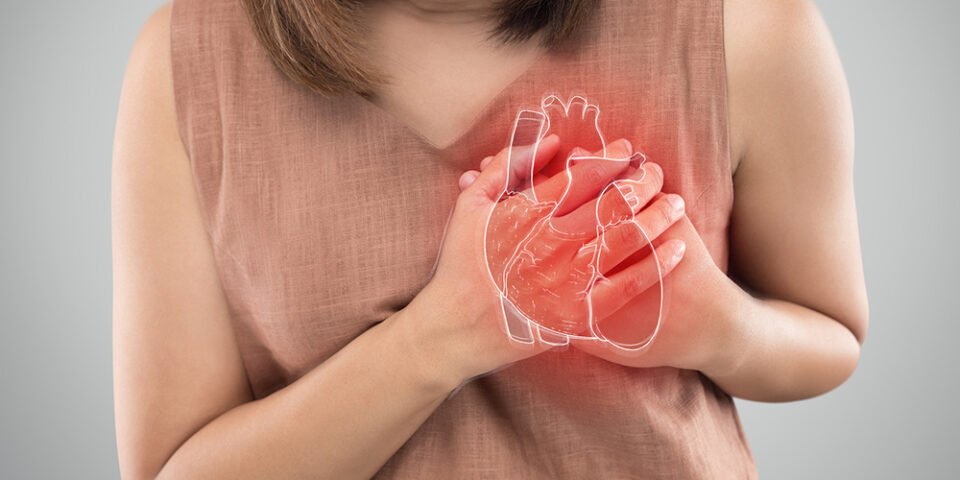Heart disease is often seen as a man’s issue, but this belief can be dangerously misleading. While both men and women suffer from heart conditions, women are more likely to experience symptoms that are subtle, easy to miss, or even misdiagnosed.
Due to such differences, many women don’t get the right help until it’s too late. It is important to know how heart disease manifests itself in women, not just for knowledge but to save lives.
In this blog, we’ll guide you about the types of heart diseases that affect women, symptoms, and how experts diagnose them.
Types of Heart Disease That Affect Women
Though coronary artery disease is common, women also develop other, less familiar types of heart disease. Below is a brief description of some that are more common in women:
Coronary Microvascular Disease (MVD): It’s a condition of coronary arteries that are extremely small and don’t easily change on standard imaging procedures. Women with MVD can experience chest pain even when they don’t have significant artery narrowing in the large coronary arteries.
Variant Angina (Prinzmetal’s Angina): It is a pain caused due to an acute coronary artery spasm. It is more common in women and may be impossible to differentiate from a heart attack.
Broken Heart Syndrome (Takotsubo Cardiomyopathy): It is caused by physical or emotional stress. This often results in acute reversible cardiac muscle weakness. It is most often seen in postmenopausal women and can mimic a heart attack.
Symptoms of Heart Disease in Women
As opposed to men, a heart attack in women does not always begin with sharp, crushing chest pain. The symptoms are not very clear and are easy to ignore. Many women have no idea something serious is going on and they attribute these signs to stress, gas, or a poor night’s sleep.
These are the signs to look for. Some of them will surprise you.
1. Chest Pain or Discomfort
The chest pain is not always very intense oftentimes, it’s merely a dull pain or pressure, like someone put a brick on your chest.
For others, it’s stabbing and sharp. Some get tightness that floats around or goes away. It may not be painful just uncomfortable. That’s why many women dismiss it or don’t even associate it with the heart.
The dangerous thing is that this can occur even when you’re doing nothing, while resting, watching TV, or sleeping.
2. Jaw, Neck, Back, or Shoulder Pain
This one’s easy to overlook. You get a strange pain in your neck or jaw, possibly even your upper back or left shoulder. You may think “Perhaps I slept incorrectly,” or “just muscle strain.” But it might be your heart trying to warn you.
The ache may begin in the chest and radiate or it may begin in the shoulder or jaw with no chest pain.
3. Shortness of Breath
Do you feel winded going up the stairs or just getting across the room? Do not ignore this sign.
Regardless of whether you’re sitting down or standing up, if you feel you cannot breath it might not be your lungs.
The heart may be working hard to pump sufficient blood, and your body is attempting to inform you.
4. Dizzy or Lightheaded
You get up, and the room whips around. Or perhaps you think that you are going to pass out, even when sitting. It may be that your brain is not getting as much oxygen as it needs.
This may occur if your heart is not pumping adequately. Don’t dismiss it, particularly if it occurs more than once.
5. Cold Sweats
If you’re sweating cold without any reason, it may be a sign. Cold, clammy perspiration can be your body’s stress reaction.
If accompanied by pain, nausea, or lightheadedness, it may be a sign that something is wrong with your heart. Especially troubling if you’re just sitting, and the sweating just appears.
6. Trouble Sleeping or Restlessness
Most women report they couldn’t sleep a night or two before their heart attack. Something didn’t feel right. Perhaps a rapid heartbeat before sleeping.
If you have trouble sleeping in addition to any of these symptoms, take it seriously.
How Doctors Diagnose Heart Disease in Women?
Because the symptoms of women tend not to be typical, experts usually perform many tests to learn more and be sure. Here’s how the diagnosis is really done by a heart specialist in Panchkula and worldwide:
- Medical History and Risk Assessment: Your doctors will inquire about your symptoms, lifestyle, pregnancy and menstrual history. Other factors include family history and any autoimmune conditions.
- Physical Examination: Heart specialists take measurements of your heart rate and blood pressure. They also look for symptoms of an abnormal heartbeat.
- Blood Tests: These may detect evidence of heart damage and test for cholesterol, blood sugar and inflammation.
- Stress Test: You will be required to walk on a treadmill or given medication that will stress the heart while it is monitored on an ECG or imaging.
- Coronary Angiography: To detect blockage of major arteries, though the test won’t detect microvascular disease, so it is not always the first option in women.
- Cardiac MRI or CT Scan: This scan is done to form images of the anatomy of the heart and the arteries with extraordinary accuracy which is helpful to detect intricate diseases.
Final Thoughts
Women’s heart disease is not always preceded by chest-holding pain. Symptoms can be less intense but not less fatal. Being sensitive to the body and consulting a professional in time can make all the difference.
If you are in Panchkula or the surrounding areas, Paras Health is a name to rely on when it comes to end-to-end heart care. They offer you a team of highly qualified heart specialist in Panchkula, along with 24/7 emergency services.
With its Cardio Science, Gynecology, Neuroscience, Oncology Science, and Gastroenterology departments, Paras Health offers the best technology coupled with experienced hands to deliver reliable results.

